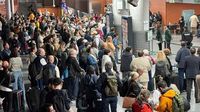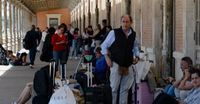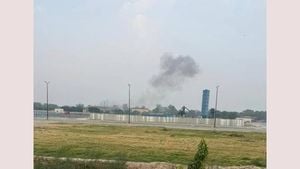On Monday, April 28, 2025, at 12:30 PM, Spain experienced an unprecedented power outage that left approximately 60% of the country without electricity. This sudden blackout, described by some experts as akin to "science fiction," has raised numerous questions about its causes and implications. As officials scramble to restore normalcy, the impact on transportation, particularly the railway system, has been significant.
In the wake of the outage, Renfe, Spain's national railway operator, announced that it would offer free commuter train tickets on Tuesday, April 29, 2025, as services began to recover. The decision came after Renfe evacuated over 35,000 passengers from stranded trains, with 116 trains affected by the outage. By 6:30 PM on Monday, 26 trains remained unevacuated, highlighting the scale of the disruption.
Pedro Sánchez, the President of the Government, held an extraordinary meeting of the National Security Council shortly after the blackout. He expressed his surprise at the event, stating, "Never has there been a drop to zero of the system." Sánchez emphasized that all state institutions and affected private companies are working diligently to ascertain the cause of the outage. He also urged citizens to avoid falling for misinformation, which has become increasingly prevalent in the digital age.
By Tuesday morning, electricity supply had been restored to 99.95%, according to Renfe. However, the railway services were still recovering, with commuter trains in Madrid operating at only 80% capacity. Services between major cities such as Madrid and Badajoz, Cádiz, Galicia, and Salamanca were suspended until further notice. Renfe reported that delays and cancellations continued to affect various routes, including those connecting Barcelona and Euskadi.
As the situation unfolded, Sánchez convened a meeting with representatives from major electricity companies to demand accountability and collaboration in investigating the outage. Preliminary reports from Red Eléctrica, the national electricity grid operator, have ruled out a cyberattack as a cause, but the exact reasons remain unclear.
In the aftermath of the blackout, many passengers found themselves stranded in train stations. Notably, around 700 individuals spent the night at the Chamartín station in Madrid, where confusion and frustration were palpable. The Minister of Transport and Sustainable Mobility, Óscar Puente, announced measures to ease the situation for transporters by temporarily relaxing driving time regulations to facilitate the restoration of services.
In the early hours of Tuesday, Renfe began to gradually restore high-speed services, with the Córdoba-Madrid line returning to normal operations by 5:00 AM. Services between Córdoba and Seville resumed shortly after 7:00 AM. However, many other lines continued to experience issues, with Avant and Media Distancia services in Andalusia only beginning to operate normally in the early afternoon.
Meanwhile, the Armed Forces played a crucial role in assisting those affected by the outage, providing support to hospitals and distributing essential supplies. They attended to over 7,000 people, offering blankets, food rations, and bottled water.
As the day progressed, the situation in Catalonia also began to stabilize, although several Rodalies lines remained without minimum services. Barcelona's city council downgraded its emergency response level after addressing the most pressing issues, entering a phase of pre-alert to monitor ongoing incidents.
In Valencia, the transport system faced challenges, with services operating under limitations. Many passengers were left waiting for updates on their journeys, leading to long queues at major train stations. Renfe's website was frequently updated to inform travelers of the status of various services.
As the chaos unfolded, the public's response varied. While some expressed gratitude for the efforts made by emergency services, others criticized the government for its handling of the situation. The leader of the opposition, Alberto Núñez Feijóo, criticized Sánchez for not declaring a national emergency during the blackout, arguing that it reflected a lack of leadership.
By the end of Tuesday, April 29, Renfe aimed to have restored most services, but challenges remained. The blackout had not only disrupted transportation but also raised concerns about the reliability of Spain's energy infrastructure. As investigations continue, the government is under pressure to provide answers and ensure that such an event does not occur again.
In summary, the power outage that struck Spain on April 28, 2025, has left a significant mark on the nation. With many questions still unanswered, the focus now shifts to restoring normalcy and preventing future incidents. The government's response and the effectiveness of the energy sector will be scrutinized in the coming days.






